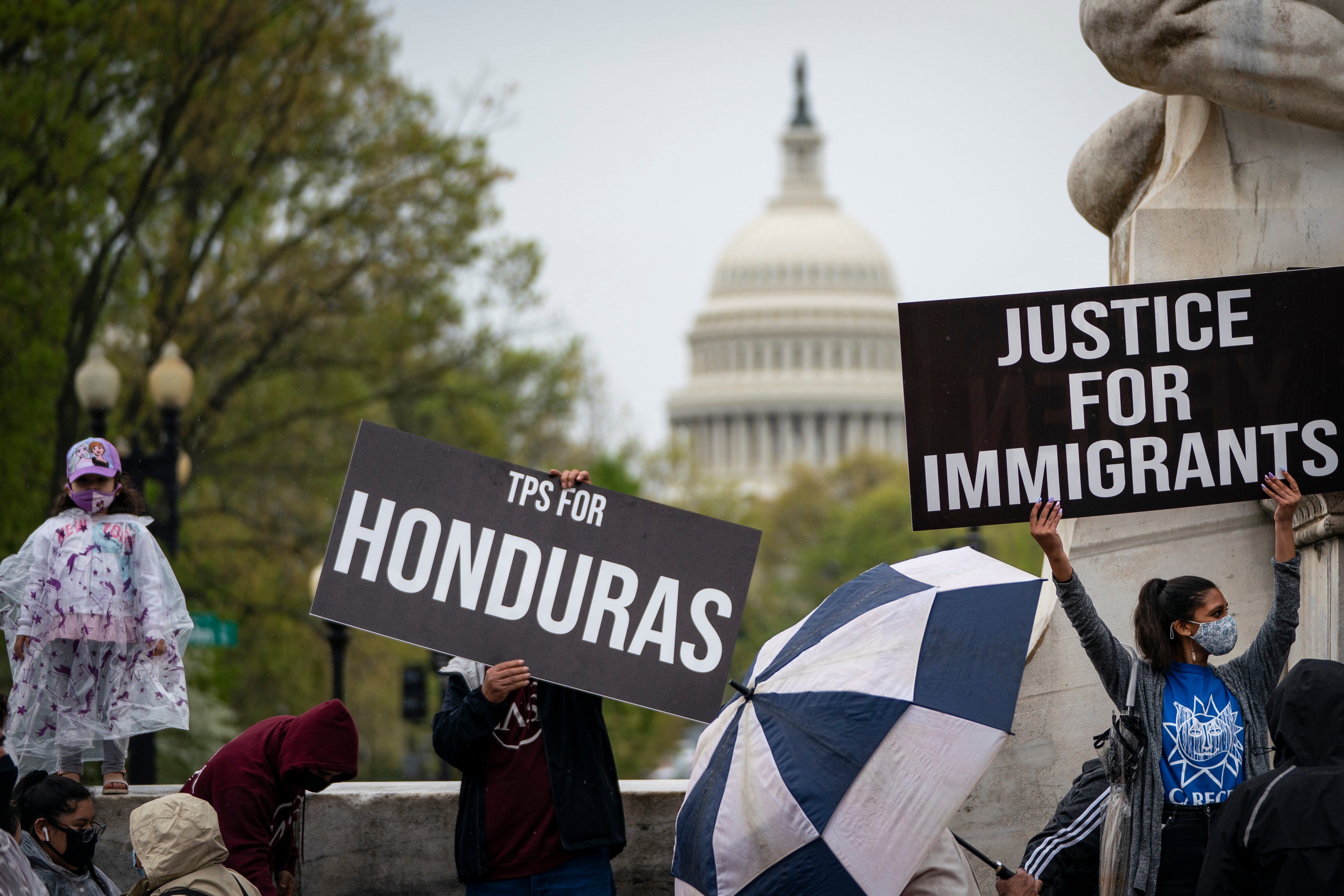‘Broken promise’: Supreme Court blocks thousands of immigrants under humanitarian protection from green cards
Immigrant advocacy groups and Democratic lawmakers urge Congress to act on immigration reform

Your support helps us to tell the story
From reproductive rights to climate change to Big Tech, The Independent is on the ground when the story is developing. Whether it's investigating the financials of Elon Musk's pro-Trump PAC or producing our latest documentary, 'The A Word', which shines a light on the American women fighting for reproductive rights, we know how important it is to parse out the facts from the messaging.
At such a critical moment in US history, we need reporters on the ground. Your donation allows us to keep sending journalists to speak to both sides of the story.
The Independent is trusted by Americans across the entire political spectrum. And unlike many other quality news outlets, we choose not to lock Americans out of our reporting and analysis with paywalls. We believe quality journalism should be available to everyone, paid for by those who can afford it.
Your support makes all the difference.The US Supreme Court ruled against immigrants legally living in the US with “temporary protected status” (TPS) from green card eligibility if they initially entered the country without legal permission, striking a blow to the thousands of immigrants who have relied on that legal status to gain a foothold into permanent residence in the country.
The unanimous decision from the nation’s high court on 7 June could impact thousands of people living in the US under those protections, which are granted to immigrants fleeing violence and unsafe conditions in their home countries.
The plaintiffs, Jose Santos Sanchez and Sonia Gonzalez, fled El Salvador in the 1990s and have lived in the US for nearly 30 years. Their youngest son is a US citizen. When El Salvador received a TPS designation in 2001, they applied and were granted status and have maintained it since. When Mr Sanchez applied for a green card in 2014, he was denied.
“The question here is whether the conferral of TPS enables him to obtain [Legal Permanent Residency] status despite his unlawful entry. We hold that it does not,” Justice Elena Kagan wrote in the court’s opinion.
Federal law provides that immigrants who are “inspected and admitted” into the US may apply for an adjustment to their status, or for lawful permanent residence, commonly known as a green card. TPS holders and advocates have argued that the arduous process of obtaining that status should fulfil the “inspected and admitted” requirements.
But Justice Kagen argued that a TPS designation is not itself an “admission”.
“An ‘admission’ is defined as ‘the lawful entry of the alien into the United States after inspection and authorisation by an immigration officer,’” she wrote. “The TPS program gives foreign nationals nonimmigrant status, but it does not admit them. ... Because a grant of TPS does not come with a ticket of admission, it does not eliminate the disqualifying effect of an unlawful entry.”
Roughly 400,000 immigrants are living in the US with TPS protections from a dozen countries, including Burma, Haiti, Honduras, Nepal, Nicaragua, Venezuela, Somalia, South Sudan, Sudan, Syria and Yemen.
Under the Supreme Court’s ruling, those who were not lawfully admitted before they received their TPS protections, many of whom are from Central America, could be at risk of being deported when those protections expire.
Claudia Lainez, a TPS holder and regional organiser for the National TPS Alliance, a coalition of more than 50 groups advocating for permanent residency statuses for TPS recipients, called the decision a “huge blow for one of the only available avenues for our families to adjust their status” in the US.
Immigration advocacy organisations, civil rights groups and Democratic lawmakers have said that the court’s decision underscores an urgency to pass immigration reform in Congress that could secure a path to lawful residence for thousands of immigrants.
“This will not deter our struggle for obtaining green cards for all TPS holders,” Ms Lainez said in a statement. “This news only emphasizes the fact that Congress must act now to guarantee permanent protections and for President Biden to expand the TPS status to everyone who deserves it.”
The House of Representatives passed a sweeping immigration reform bill in March that would create a citizenship process for undocumented immigrants who were brought to the US as children, or Dreamers, as well as TPS recipients. The measure passed by a vote of 228-197.
US Senator Ben Cardin, among lead sponsors of a Senate measure, the SECURE Act, that would provide a pathway to permanent residence for TPS recipients, said that TPS protections are “supposed to show that the US is the Land of Compassion to those in humanitarian distress.”
“Today’s SCOTUS decision instead makes ours the Land of the Broken Promise,” he said.
Last month, the Biden administration renewed TPS designation for Haiti, which Homeland Security Secretary Alejandro Mayorkas said is “experiencing serious security concerns, social unrest, an increase in human rights abuses, crippling poverty, and lack of basic resources, which are exacerbated by the Covid-19 pandemic.
On the heels of that decision, a coalition of immigration advocacy groups and activists to pass the SECURE Act have pushed Congress and the administration to “provide a long-term solution for immigrants who have made America their home and who contribute immensely to the fabric of our nation,” said Namrata Pokhrel, a Nepali TPS holder from Texas.
“Living deadline to deadline, under the constant threat of being sent back to perilous conditions is not protection,” she said in a statement.
Join our commenting forum
Join thought-provoking conversations, follow other Independent readers and see their replies
Comments